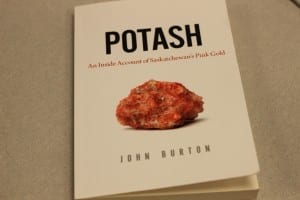U of R Book Series

An examination of potash, past, present, and future
“I asked Don [Black] if there was any chance potash could be developed by the province; that is, through public ownership. His response was, ‘I’m afraid not John. We just don’t have the finances or personnel that would be required.’” And with that, our province lost out on an industry worth billions annually, our gilded egg laying goose.
Potash: An Inside Account of Saskatchewan’s Pink Gold, is John Burton’s account and analysis of the early days of potash development in the province of Saskatchewan, from the initial discovery in 1942 to the Potash Corporation of Saskatchewan being sold off by the Grant Devine government in 1989 – an event that Burton regards as the death of the company.
However, from the genesis of potash development in the province it was not Canadian companies mining, but American ones.
“When I first came on the scene the decision had already been made. The government decided we can’t do this on our own” says Burton.
This was a decision that was already out of the hands of the Saskatchewan government.
As it stands, Saskatchewan holds 53 per cent of the world’s potash deposits. Potash is used largely as a fertilizer, opposite nitrogen and phosphorus. As such, it is instrumental in agriculture and food production the world over.
Burton stated, “It is my contention, that Saskatchewan would be much better off if potash had remained in the public fold. It would’ve been better off for the corporation and for the people of Saskatchewan.”
This is a hard point to disagree with, given that in 2012 potash sales and royalties generated close to $6 billion, with the Saskatchewan government seeing 7 per cent of these royalties.
As much as it recounts in factual detail the initial rumblings of potash development, the book also gives candid anecdotes of the Co-Operative Commonwealth Federation (CCF) party during its prime.
“At the time, it wasn’t easy, because of the actual circumstances of the provincial difficulties, debt, and drought, etc. But also because there were quite a lot of people who … regarded CCF as being a bunch of Bolsheviks.” In fact some of the province mused, “CCF meant Crazy Canadian Farmers.”
An overarching theme of the book is the struggle between public and provincial ownership and the growing trend of corporate dominance.
“I’m trying to persuade people to think about what should we do now- what should we do in the future.”
Though Burton does not give a plan for the future, he does express his concern in moving forward.
“People, from here on have to make up their mind whether they’re just going to let the world carrying as it is, with the corporate world having an even greater stranglehold on the economy and on society or are we going to do something about? Are we going to change directions? In order to change directions, it’s going to take some tough decisions and it’s going to involve some quite drastic action.”
At it’s core Potash: An Inside Account of Saskatchewan’s Pink Gold is a vision of what could have been and a cautionary tale for the future. Moving forward we will have to face the issues brought on by corporate ownership of natural resources and their subsequent affect on our society. For Saskatchewan, the seeds of this trend are traced back to their origin in Burton’s book.









